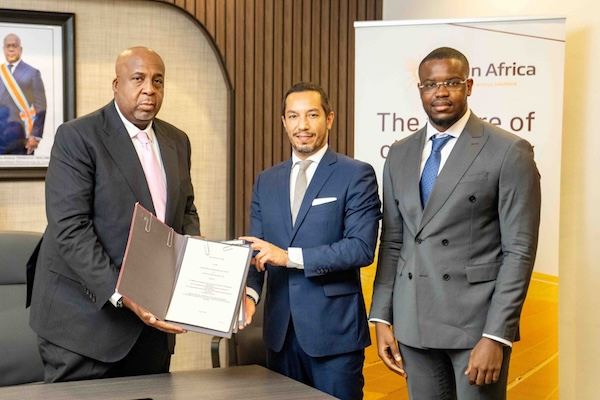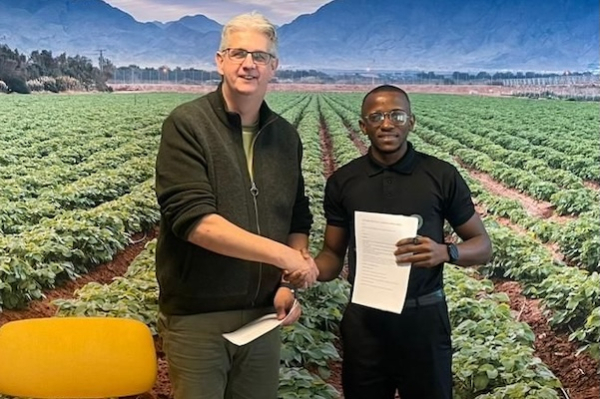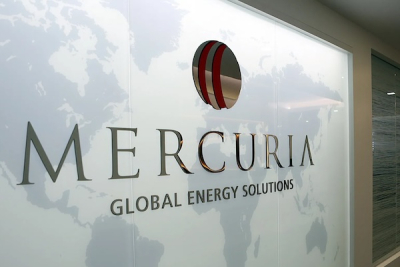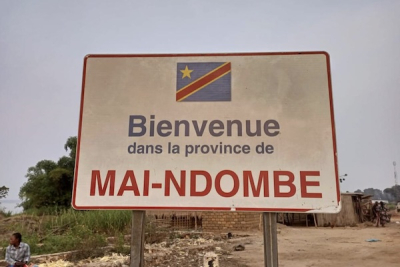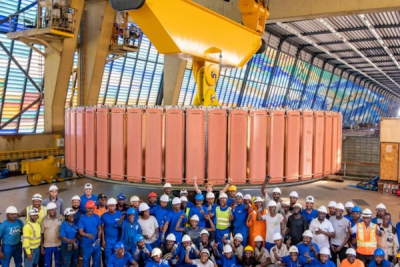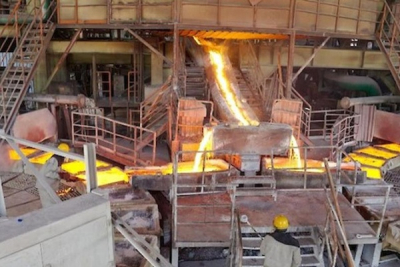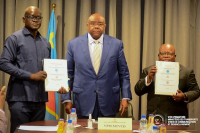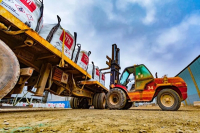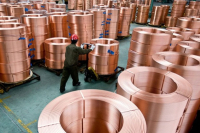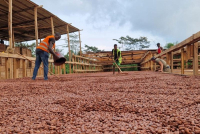
News (638)
The Democratic Republic of Congo (DR Congo) and U.S. developer Sun Africa signed in late October 2025 a memorandum of understanding to implement a program called “Energy for Prosperity,” according to Mike Luntadila Koketua, president of MFS Group, which serves as the developer’s local partner.
According to Luntadila, the program aims to install generation infrastructure with a total capacity of 4,000 MW by combining solar power, hydropower, and energy storage. It also includes plans to reinforce high- and medium-voltage transmission lines to modernize the national grid and support the country’s industrial transformation.
This is a large-scale initiative. For context, the Electricity Sector Regulatory Authority (ARE) estimated the country’s installed capacity at 3,646.5 MW in 2024, meaning the project’s planned capacity exceeds current levels. However, several details remain unclear, including the exact location of the plants, construction timeline, and financing structure.
Sun Africa describes itself as a developer of large-scale renewable energy and off-grid electrification solutions, including mini-grids and solar kits, across Africa. Its projects so far range from 25.4 to 370 MW, mainly in Angola, with rural electrification initiatives also planned in Nigeria and Namibia.
Based in Miami, the company announced in August 2024 that it had become the “new private partner” of the Power Africa initiative, under a plan to add up to 6,500 MW of new capacity and connect more than eight million households and businesses across the continent.
Frico Agri, a Congolese company that produces frozen fries from locally grown potatoes, has signed three memorandums of understanding (MoUs) with Dutch firms, Delphy B.V., Go&Grow Farm Solutions, and Agrico B.V., to support the growth of the potato industry in the Democratic Republic of Congo (DRC).
The partnerships were formalized during a business visit to the Netherlands from October 13 to 30, 2025, led by Frico Agri founder Jean Johnson Bapanga. The mission received technical support from the Netherlands Enterprise Agency (RVO), the Dutch Embassy in the DRC, the Orange Corners program, and Ingenious City.
The planned collaboration with Delphy B.V. will focus on adapting agricultural practices to local growing conditions. The firm will offer expertise in sustainable soil management, integrated pest control, climate-smart farming, and technical training for local producers.
Go&Grow Farm Solutions will help Frico Agri modernize its operations by strengthening mechanization, upgrading storage facilities, and training local staff.
The proposed agreement with Agrico B.V. covers a 10-hectare pilot project to grow the Markies potato variety in Kongo Central province. The project includes varietal trials, producer training, and agronomic monitoring to improve yields and quality. Frico Agri expects the pilot to produce around 450 tons of potatoes per year, enough to keep its processing plant supplied between harvests.
Founded in 2019, Frico Agri has a monthly capacity of 20.8 tons of frozen fries, processing about 41.6 tons of potatoes. Internal reports show that since 2024, the company has faced two major bottlenecks: a shortage of high-quality seed potatoes for industrial processing and inadequate storage facilities. These challenges are linked to limited specialized potato cultivation and a lack of local expertise in varietal selection and post-harvest handling.
Frico Agri hopes to overcome these obstacles through the planned partnerships, though the signing dates and implementation timeline have yet to be announced.
Ronsard Luabeya
Mercuria Energy Trading has signed a three-year deal to source copper from Eurasian Resources Group (ERG) operations in the Democratic Republic of Congo (DRC). The agreement, announced in a statement issued on October 30, 2025, includes a pre-financing facility of up to $100 million from Mercuria to ERG.
Details such as the loan’s interest rate, copper volumes, and pricing terms have not been disclosed. Off-take agreements of this kind are often viewed with suspicion by the Congolese government and state mining company Gécamines, which argue their interests are not always protected. Both are recipients of mining tax revenues and minority shareholders in several joint ventures, and have repeatedly demanded the right to market their production share directly.
The deal enables Mercuria to strengthen its supply from the DRC, following agreements reached in late 2024 and March 2025 to secure half of Gécamines’ copper entitlement from the Tenke Fungurume mine. Gécamines holds a 20% stake in TFM, which has annual production exceeding 450,000 tons.
ERG, 40% owned by the Kazakh state, is one of the DRC’s major copper producers. Through its subsidiaries Frontier and Metalkol, it sold 120,176 tons of copper in 2024, according to official data. Production could rise in the coming years, as ERG controls several other projects previously stalled by disputes with the government or Gécamines, including the Swanmines project, now set to resume after a settlement reached in September.
Mercuria said the financing aims to support the development of ERG’s operations in the DRC while strengthening the group’s trading portfolio and financial flexibility.
Founded in Geneva in 2004, Mercuria is one of the world’s leading commodities and energy trading firms. The DRC is “a region of growing strategic relevance,” said Kostas Bintas, the company’s Global Head of Metals and Minerals.
The DRC was the world’s second-largest copper producer in 2024, behind Chile, with output of 3.1 million tons. Demand for the metal continues to surge, fueled by the energy transition and artificial intelligence.
The International Energy Agency (IEA) estimates that global copper supply could fall short by 40% by 2035, a looming deficit that has helped lift prices nearly 20% over the past year, with futures trading around $11,500 a tonne on the London Metal Exchange.
Pierre Mukoko & Ronsard Luabeya
Inongo, chief town of DR Congo’s Mai-Ndombe province, is grappling with a diesel shortage that has pushed fuel prices sharply higher. The price of a liter has risen from 5,000 to 7,000 Congolese francs, an increase of about 40%, as service stations and local distributors run out of supply.
According to state media Agence congolaise de presse (ACP), Joda Imana, head of the local fuel retailers’ association, confirmed the shortage saying that the crisis has hit both the Engen station and private fuel depots in the city. The situation has worsened in recent weeks as falling water levels on Lake Mai-Ndombe have hampered navigation and disrupted fuel deliveries.
The spike comes just weeks after Economy Minister Daniel Mukoko Samba announced a reduction in fuel prices across the country’s western zone, which includes Mai-Ndombe. Gasoline prices were lowered from 2,990 to 2,690 francs per liter and diesel from 2,980 to 2,680 francs, following an appreciation of the Congolese franc against the dollar.
Landlocked and heavily reliant on its river network, Mai-Ndombe depends on diesel to power boats, transport vehicles for agricultural and forestry goods, and generators in areas without electricity. The ongoing shortage threatens to paralyze local logistics and trade across the lake and surrounding rivers.
Ronsard Luabeya
Ivanhoe Mines said its Kamoa-Kakula copper complex in the Democratic Republic of Congo will start receiving 50 megawatts (MW) of power from the Inga II hydropower plant in November. The delivery marks a key step toward securing a stable energy supply for one of the world’s largest copper operations.
The energy will come from Turbine 5 at Inga II, which has a capacity of 178 MW and has been under rehabilitation since 2022 by Ivanhoe Mines Energy, a subsidiary of the company. Power deliveries will be phased: 50 MW in November 2025, 100 MW in the first quarter of 2026 and 150 MW in the first half of 2027, as grid upgrades are completed.
According to Ivanhoe’s third-quarter 2025 report, the mechanical and electrical refurbishment of Turbine 5 was completed during the quarter, marking a major milestone in the company’s energy investment program. The mine will receive increasing power volumes as ongoing grid reinforcement work progresses at the Inga (SCI) and Kolwezi (SCK) substations. These upgrades include installing resistors, harmonic filters and a static compensator to stabilize voltage and improve power quality to Kamoa-Kakula.
The modernization and grid stabilization program, launched in late 2024, is backed by $200 million in financing from Ivanhoe Mines and its joint-venture partner Zijin Mining.
By 2027, the Kamoa-Kakula complex could become self-sufficient in power, eliminating reliance on imported electricity from Zambia and Mozambique. This will be achieved through the combination of Inga II supply and two solar power plants under construction by CrossBoundary Energy DRC and Green World Energie SARL, each designed to deliver 30 MW.
The solar projects were 42 percent and 46 percent complete, respectively, as of the end of the third quarter, with commercial operations now expected in the second quarter of 2026, slightly ahead of schedule. Ivanhoe said long-lead equipment, including battery energy storage systems (BESS), inverters and mounting structures, has already been shipped and unloaded on site.
Timothée Manoke
Kamoa-Kakula, the Democratic Republic of Congo’s largest copper mine, generated $2.4 billion in revenue between January and September 2025, a 6.7 percent increase from the same period last year, according to the third-quarter report released on Oct. 29 by operator Ivanhoe Mines. The mine, one of the world’s biggest copper producers, recorded annual revenue of $3.1 billion in 2024.
The increase came despite a sharp third-quarter decline in sales. Revenue for July to September fell 31 percent year-on-year to $566.3 million from $827.8 million in 2024. Ivanhoe attributed the drop to a seismic event in May that disrupted part of the mine and led to a 38 percent fall in copper output to 71,226 tons from 116,313 tons.
Higher prices partially offset the production loss. The average realized copper price rose to $4.42 per pound, or about $9,700 per tonne, compared with $4.16 per pound a year earlier.
Despite the incident, Kamoa-Kakula expects to maintain full-year revenue of around $3 billion, similar to 2024. Copper output for the first nine months of 2025 totaled 316,393 tons, and Ivanhoe maintained its full-year production forecast of 370,000 to 420,000 tons. That implies output of 53,600 to 103,600 tons in the fourth quarter. Unsold copper inventories stood at roughly 59,000 tons at the end of September, which should help lift fourth-quarter sales.
Operating profitability, however, is set to decline. EBITDA represented 44.3 percent of revenue for the first nine months of 2025, down from 61 percent a year earlier.
Capital spending at Kamoa-Kakula reached $910 million through September, with full-year investment now projected between $1.3 billion and $1.5 billion,about $100 million lower than earlier estimates. Ivanhoe expects to invest between $410 million and $580 million in the final quarter.
Kamoa-Kakula is jointly owned by Canada’s Ivanhoe Mines and China’s Zijin Mining, which each hold 39.6 percent. The Congolese government owns 20 percent and Crystal River holds 0.8 percent.
Pierre Mukoko
The Democratic Republic of Congo plans to modernize the Kisangani river port to establish it as a key multimodal transport hub along the Congo River. The Ministry of Transport signed two memorandums of understanding on October 30, 2025, with the Northern Corridor Transit and Transport Coordination Authority (NCTTCA), in the presence of officials from the National Transport Office (ONATRA) and the Coordination and Monitoring Unit for Regional Corridor Programs (CEPCOR).
The first agreement covers the construction of a pilot rest and service station in Songololo, in Kongo Central Province, along National Road No. 1 linking Kinshasa to Matadi. The second focuses on developing and modernizing the Kisangani port. Timelines for final agreements and project implementation have not yet been announced.
According to Gabin Lulendo, a member of CEPCOR’s steering committee, the partnership aims to turn Kisangani into a regional hub for multimodal transport. The project includes rehabilitating and extending the port’s operational quays to improve connectivity between eastern Congo and Kenya’s Port of Mombasa via the Northern Corridor. It forms part of broader efforts to enhance regional cooperation in logistics and trade facilitation.
Built in the 1920s, the Kisangani port has lost much of its operational capacity. Between 2022 and 2023, activity dropped by 30 to 40 percent due to poor maintenance and aging infrastructure. Once-functional cranes now stand idle, while deteriorating road links with eastern Congo have further weakened commercial traffic.
Ronsard Luabeya
Chinese mining giant CMOC Group Ltd reported cobalt sales of 6.2 billion yuan ($850 million) between January and September 2025, down just 7.8% year on year, despite a months-long suspension of exports from the Democratic Republic of Congo (DRC). The ban, in place from February 21 to October 15, affected all of CMOC’s cobalt operations, including its flagship Tenke Fungurume and Kisanfu mines.
The embargo cut cobalt sales volumes by 36% to 51,027 tons, but higher global prices offset much of the impact. CMOC said the average cobalt price rose to $16,730 per tonne, up 44% from a year earlier, helping stabilize revenue.
The company continued to fulfill supply contracts for four months before declaring force majeure on June 30. While CMOC did not specify the source of its shipments during the export halt, analysts believe the group relied on pre-existing stockpiles held outside the DRC, particularly in logistics hubs such as Durban (South Africa) and Walvis Bay (Namibia).
Production data support that assessment. CMOC produced 87,974 tons of cobalt in the first nine months of 2025, averaging under 10,000 tons per month, too little to explain sales levels given the export freeze that began in February.
CMOC’s profitability improved despite the disruption. The company’s gross margin on cobalt rose 27 points to 63.5%, while operating costs fell nearly 47% to just over 2 billion yuan. The company attributed the gain to greater energy efficiency, process optimization, and effective foreign exchange management.
Following the end of the embargo on October 16, the Congolese government introduced an export quota system, capping national cobalt shipments at 18,125 tons for the final quarter of 2025 and 96,600 tons for 2026. CMOC received allocations of 6,500 tons for 2025 and 31,200 tons for 2026.
The new system is expected to keep global cobalt prices elevated, with the metal trading above $45,000 per tonne on the London Metal Exchange, more than double its level when the ban began. However, it also restricts CMOC’s ability to manage its offshore inventories.
Executives at the company have recently described the situation as difficult to sustain, signaling growing pressure on supply flexibility despite the group’s strong margins.
Pierre Mukoko
Chinese mining group CMOC announced it has received board approval to proceed with a $1 billion expansion project at its Kisanfu mine in the Democratic Republic of Congo (DRC), according to the company’s third-quarter financial report published on October 24, 2025.
The development is expected to take two years, with commissioning scheduled for late 2027.
Once operational, the project will boost Kisanfu's copper production capacity by 100,000 tons, bringing the total annual output to more than 250,000 tons. When combined with the Tenke Fungurume mine’s capacity of over 450,000 tons, CMOC’s total copper production in the DRC is set to exceed 700,000 tons per year.
This substantial investment aligns with a favorable market outlook for the red metal. Global copper demand is projected to rise due to the accelerated pace of the energy transition and the boom in artificial intelligence. The International Energy Agency (IEA) estimates that supply from current mining projects will be insufficient to meet future demand, forecasting a copper supply deficit of up to 40% by 2035. This prospect guarantees sustained price appreciation for the metal.
All of CMOC's current copper production originates from the DRC. For the first nine months of 2025, the group reported producing 543,376 tons, marking a 14.1% increase from the same period in 2024. Over the same nine months, sales volume rose 10.5% year-on-year to 510,312 tons.
These sales generated revenue of 38.6 billion yuan (approximately $5.3 billion at the average exchange rate), a 25.6% increase from a year earlier, with an average realized price of $10,409 per ton.
However, these strong commercial results were largely offset by a 21% surge in operational costs, which climbed to 17.7 billion yuan ($2.4 billion). Consequently, the company’s gross profit margin only increased by 1.7%, settling at 20.9 billion yuan ($2.8 billion). This outcome suggests that the corporate tax revenue received by the Congolese state may see little to no increase.
Pierre Mukoko
The export price of cocoa from the Democratic Republic of Congo (DRC) has fallen sharply, the latest index from the Ministry of Foreign Trade shows, cutting payments to local farmers.
Between October 20 and 25, 2025, the official price for high-quality cocoa beans ranged between $5.30 and $5.60 per kilogram at border points such as Matadi, eastern DRC, and Zongo, a 40% drop from the June 23-28 period. All grades of cocoa have been affected.
Producers have been hit hard. In Ituri province, prices paid to farmers plunged from 20,000 Congolese francs to 6,000 francs (about $2.70) per kilogram across the Irumu and Mambasa territories.
Dieudonné Kambale, an agronomist with eastern exporter ESCO Kivu, says that weak local processing is partly to blame, according to 7sur7.cd. Many farmers sell beans just two or three days after harvest, drying them directly under the sun instead of letting them ferment for a full week. That same concern was raised in July by Mumbere Musumba Jackson, head of the regional agricultural and perennial produce buyers’ association.
Kambale also pointed to rising output across Africa. Favorable weather in West Africa, the world’s top-producing region, and progress against the swollen shoot virus that had suppressed yields are boosting confidence among major buyers.
Côte d’Ivoire and Ghana both expect strong harvests, with Ghana’s agriculture minister expecting output to exceed 650,000 tons in the 2025/26 season, according to Ecofin Agency.
Industry Shifts to Cocoa Alternatives
Global chocolate makers are also moving to reduce their reliance on cocoa beans and butter, experimenting with substitutes such as cocoa pulp and vegetable oils. In August, Nestlé, one of the world’s top five confectionery companies, unveiled a new chocolate recipe using 30% cocoa fruit derivatives, including pulp previously discarded. The step is meant to cut the share of cocoa beans in its products.
These global trends come as the DRC pursues an ambitious goal of becoming the world’s top cocoa producer within five years. Agriculture Minister Muhindo Nzangi recently reaffirmed the target of 3 million tons by 2030, up from 100,000 tons in 2024, according to ministry data.
To reach that goal, the government plans to form a special brigade to protect plantations from ADF rebel attacks, which authorities say are partly financed by cocoa. Other measures include cutting export paperwork to 24 hours and reviving the Bengamisa (CABEN) plantation in Kisangani, Tshopo province, by redeveloping 5,000 hectares left idle for 25 years.
Timothée Manoke
More...
The city of Gbadolite, capital of Nord-Ubangi province, is gradually regaining electricity after a one-year blackout caused by the flooding of the Mobayi-Mbongo hydropower plant on October 23, 2024.
The facility, with an installed capacity of 11.5 MW, has been brought back online, provincial energy minister Didier Dutimo announced on October 26, 2025, in an interview with Top Congo.
Power supply remains limited, however. “Much remains to be done, as parts of the SNEL (National Electricity Company) network vandalized by delinquents still need to be restored to balance the electrical load,” he said without providing further details.
The Mobayi-Mbongo hydropower plant, inaugurated on November 24, 1989, suffered severe damage when floodwaters from the Ubangi River inundated the alternator, control room, and several other components, forcing a complete shutdown.
In the months that followed, SNEL dispatched technical teams from Kinshasa and Inga to attempt repairs, but the work did not allow for an immediate restart, according to local SNEL director Maurice Ewango.
Without power, Gbadolite was plunged into darkness, a situation that severely affected the city’s economic and social activities.
Vietnamese conglomerate Vingroup has revealed new details about its plans in the Democratic Republic of Congo (DRC). On October 25, 2025, the company signed a memorandum of understanding with the city-province of Kinshasa to develop an urban project covering about 6,300 hectares, land that will be provided “free of charge” by the city.
According to the group’s announcement, “the project is located between the southern bank of the Congo River and the northern area of N’djili International Airport, a strategic site for the city’s expansion plan.” It aims to create a “new modern urban center” that will become a tourist destination and a symbol of Kinshasa’s progress.
The development will include residential zones, villas, apartments, hospitals, schools, shopping centers, hotels, leisure complexes, and an administrative district for ministries and government agencies.
The Vingroup project will be built in the Maluku commune, which already hosts the ongoing expansion program of the city of Kinshasa. Its content and objectives appear consistent with this larger program, which plans a new city covering 43,000 hectares about 60 kilometers from the urban center, suggesting that the Vingroup project could become one of its components.
However, the Strategic Supervision Committee for the Kinshasa City Expansion Project (CSSPEVK) is not a signatory to the October 25 memorandum, raising potential coordination and alignment challenges between the two initiatives.
Focus on clean mobility
In addition to real estate, the memorandum includes a green mobility program for Kinshasa. Through its subsidiary VinFast, founded in 2017 and specializing in electric vehicles, Vingroup plans to progressively replace about 300,000 combustion vehicles with electric ones and deploy electric buses and taxis operated via its Green and Smart Mobility (GSM) solution, already active in Vietnam.
On its official website, VinFast lists electric vehicles priced between $10,800 and $59,900, marketed in Germany, Canada, the United States, and several Asian countries.
The provincial government is expected to provide sites for installing charging infrastructure. The green mobility project is expected to cut greenhouse gas emissions and improve air quality in the capital. As of October 15, 2025, Swiss firm IQAir, which monitors air quality, ranked Kinshasa among the world’s most polluted cities, with air quality considered unhealthy.
The signing of the memorandum with Kinshasa came three days after a meeting between Vingroup Vice Chairwoman Lê Thị Thu Thủy and Prime Minister Judith Suminwa Tuluka.
During the meeting, the conglomerate said it had completed the exploratory phase of its projects in the DRC, conducted an initial assessment, and was ready to move into the contractual phase under public-private partnerships. The timeline for the final agreement and the start of the urban project’s implementation has not yet been disclosed.
Grace Nkuanga Bilolo, governor of Kongo-Central province in the Democratic Republic of Congo, launched a road rehabilitation project on Oct. 25, 2025, aimed at improving the transport of farm goods to markets.
The project, which began in Kinzau Nvuete in Seke-Banza territory, covers 550 kilometers of rural feeder roads. The work will be carried out in stages, with the first phase focusing on 230 kilometers of priority routes over nine months.
The first phase, financed by the Agency for the Management of Toll and Weighing Rights (AGDP), will cost 3.85 billion Congolese francs (about $1.6 million), or roughly $7,000 per kilometer.
The launch phase includes the Kinzau-Mvuete, Seke-Banza, Mbatassiala, and Lombo-Fuese-Kilukweta sections, located in the Kasangulu and Mbanza-Ngungu territories. The Kongo-Central Public Works Agency will carry out the work.
Governor Bilolo unveiled new civil engineering equipment purchased with provincial funds to support the project. He said the initiative is part of a provincial program to better connect rural areas, aiming to ease the sale of farm produce and improve living standards in local communities.
The governor’s announcement follows a statement by former Rural Development Minister Muhindo Nzangi Butondo in October 2024, outlining a government plan to build and rehabilitate 11,000 kilometers of agricultural feeder roads across the DRC. It was not immediately clear whether the Kongo-Central project is part of that national initiative.
Ronsard Luabeya
The Democratic Republic of Congo (DRC) has launched an international call for partners to build a domestic train assembly and manufacturing plant.
The document, signed on Oct. 17, 2025, by Transport Minister Jean-Pierre Bemba, seeks private partners to set up assembly units capable of producing dozens of locomotives and wagons each year. The project also calls for training and technology transfer to local engineers and technicians.
Planned as a 25- to 30-year public-private partnership (PPP), the initiative includes maintenance facilities, spare parts production, and vocational training.
Two sites are under consideration: Matadi, the country’s main Atlantic port, and Kalemie, a key railway junction in Tanganyika province.
The project marks a step toward developing a local railway industry in a country that relies heavily on imported rolling stock. While the government supports the plan, it faces major structural and financial hurdles.
Macroeconomic risks such as exchange-rate volatility, payment delays, and regulatory uncertainty could deter investors. Continued dependence on imported components also exposes the project to high logistical and financial risks.
Expected productivity gains could be constrained by a shortage of skilled labor, the absence of local subcontractors and integrated logistics, and persistent bottlenecks in energy, transport, and digital infrastructure.
By comparison, South Africa and Egypt built their railway industries only after decades of investment in technical training and industrial subcontracting.
According to the call document, the DRC has over 5,000 kilometers of railway lines, much of which is underused or non-operational, limiting the market’s current potential. The government, however, has begun rehabilitating national and regional rail corridors, including the Lobito Corridor linking Angola, Zambia, and the DRC, and the Tanganyika Corridor to Tanzania.
In September 2025, the government relaunched the 366-kilometer Kinshasa-Matadi line, reconnecting the capital with its main seaport and adding new rolling stock. The line is expected to be extended to the Banana deep-water port, now under construction, to strengthen both domestic and international trade.
If these projects succeed, they could ease mobility constraints in a country where roads and river transport remain overburdened by degraded infrastructure, congestion, outdated vessels, unmarked waterways, and frequent accidents that all continue to raise logistics costs and weaken economic competitiveness.
Pierre Mukoko






